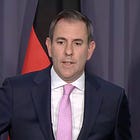RBA's Productivity Downgrade Signals Economic Crisis, Opposition Claims
Shadow Finance Minister James Patterson accused the Reserve Bank of Australia of delivering a "vote of no confidence" in the government's economic agenda Tuesday after the central bank lowered productivity growth expectations to what he called "crisis levels."
The RBA cut the official cash rate by 25 basis points to 3.75% in its third reduction this year, but Patterson said the bank's decision to downgrade productivity growth forecasts from 1% to 0.7% represented the real story behind Tuesday's monetary policy announcement.
"That really is an astonishingly low number and it means all of us are poorer unless we can fix it," Patterson told ABC's Afternoon Briefing following the RBA's decision.
The productivity forecast revision dominated Patterson's criticism of the government's economic stewardship, with the opposition finance spokesperson arguing the downgrade reflected broader structural problems with Australia's economic trajectory under the current administration.
"If the governor was confident about the future of the Australian economy, they wouldn't be reducing their expectations for productivity growth down to 0.7%," Patterson said.
Mortgage Relief Overshadowed by Broader Pain
While acknowledging today's interest rate cut would provide relief to mortgage holders, Patterson argued Australian families remained significantly worse off under the current government despite three rate reductions in 2024.
"If you have an average mortgage of about $600,000, you'll be about $100 better off every month," Patterson said. "But the totality of your financial position since this government is elected is, in fact, your $1,800 a month worse off."
Patterson attributed the deterioration to 12 interest rate rises implemented during the government's tenure, compared to just three cuts, leaving average mortgage holders more than $20,000 annually worse off before accounting for increased electricity, grocery and petrol costs.
The opposition's calculation challenges the government's narrative around economic management as Australia navigates persistent inflation pressures and housing affordability concerns.
Historical Context of Productivity Decline
Patterson placed the current productivity crisis in historical perspective, noting the dramatic decline from previous decades when productivity growth drove living standard improvements.
"In the 80s and 90s, productivity growth was about 3% a year. In the early 2000s, it was about 2% a year. For most of the 2010s, it was about 1% a year," he said.
The Shadow Finance Minister directly linked productivity performance to living standards, arguing that without productivity growth, Australians' economic wellbeing would stagnate.
"If productivity doesn't grow, their living standards don't grow, and that means we'll be poorer than we otherwise should have been," Patterson said.
He attributed the productivity decline to government policies including labor market re-regulation, the introduction of 5,000 new regulatory measures, and increased government spending concentrated in low-productivity sectors.
Government Employment Dominance Questioned
Patterson highlighted concerning trends in employment composition, claiming 82% of new jobs created under the current government occurred in government-funded industries with traditionally lower productivity levels compared to market sector employment.
"It's overwhelmingly been in the non-market sector. About 82% of new jobs created on this government watch are in government-funded industries. And productivity in those industries is very low compared to the market sector," he said.
This employment pattern, according to Patterson, explained the broader productivity decline and represented an unsustainable economic trajectory requiring urgent correction.
Truth matters. Quality journalism costs.
Your subscription to The Evening Post (Australia) directly funds the investigative reporting our democracy needs. For less than a coffee per week, you enable our journalists to uncover stories that powerful interests would rather keep hidden. There is no corporate influence involved. No compromises. Just honest journalism when we need it most.
Not ready to be paid subscribe, but appreciate the newsletter ? Grab us a beer or snag the exclusive ad spot at the top of next week's newsletter.
Tax Reform Principles Diverge
Ahead of next week's government-hosted economic roundtable, Patterson outlined the opposition's approach to potential tax reform, establishing clear philosophical differences with the government's stated principles.
"We're very open to tax reform, although we have a different set of principles to what the Treasurer has outlined," Patterson said.
He rejected the government's requirement that tax reform proposals be "budget neutral or better" for government revenues, instead advocating for reforms that benefit taxpayers directly.
"We think that the proposals should be budget neutral or better from the point of view of taxpayers. We want lower tax for Australians," Patterson said. "We don't think that Australians out there right now are not paying enough tax and should pay more tax."
Spending Discipline Commitment
Patterson acknowledged the opposition would need to demonstrate fiscal restraint if elected, including rejecting some potentially beneficial proposals deemed unaffordable within current budget constraints.
"We will have to demonstrate fiscal discipline and we will have to say no to some proposals, which might be a good idea in abstract, but are not affordable when considered against all the other expenses that government has," he said.
However, he outlined a strategy for reducing government's economic footprint without implementing dramatic spending cuts, proposing to slow government spending growth relative to overall economic expansion.
"If government spending grows at a slower rate than the economy grows, then over time, government as a proportion of the economy declines without cutting spending. It just means it doesn't grow as fast," Patterson explained.
Current Spending Levels Criticized
Patterson characterized current government spending levels as historically unprecedented outside recession periods, arguing they required immediate attention.
"We are now at emergency levels of government spending. Outside a recession, government spending as a proportion of the economy has never been higher than it is today. You have to go back 30 to 40 years to get to those levels again," he said.
This spending critique formed part of the opposition's broader economic narrative, linking high government expenditure to productivity concerns and overall economic underperformance.
Palestinian Recognition Reversal Confirmed
On foreign policy, Patterson confirmed the Coalition would revoke Australia's recognition of a Palestinian state if elected, arguing the government's decision undermined peace prospects by removing reform incentives.
"What the Prime Minister has done by effectively giving unconditional recognition to a Palestinian state is he's taken away the incentive from Australia's position, at least, for a Palestinian Authority to reform," Patterson said.
He argued recognition eliminated incentives for Palestinian democratization, demilitarization, and cessation of terror funding, criticizing the Prime Minister for accepting promises from "a president of the Palestinian Authority who is 20 years into his four-year term."
Regional Security Considerations
Patterson suggested any future Palestinian governance arrangements would require multinational coordination, particularly involving Arab states in Gaza's post-conflict administration.
"I think most states in the region recognise that this would have to be a multinational effort, that Arab states in particular have a leadership role to play in the rebuilding and administration of Gaza after this crisis," he said.
RBA Governor's Measured Response
While Patterson interpreted the productivity forecast revision as implicit criticism of government policy, he acknowledged RBA Governor Michelle Bullock's careful approach to political commentary.
"I admire Michelle Bullock. I think she's an excellent RBA governor. She's very careful with her words and she would never want Australia into political debate and nor should she," Patterson said.
Economic Roundtable Expectations
Despite criticizing the government's economic record, Patterson indicated the opposition would participate constructively in next week's productivity discussions while maintaining their fiscal principles.
"The obligation is on us to be constructive and to propose ideas, and we will do that. And if there are good ideas that come out of this process that the government wants to adopt, we will back them and we will support them to do that," he said.
However, he emphasized the government lacked a mandate for tax increases, noting they had dismissed such possibilities as "scare campaigns" during the previous election.
Broader Economic Implications
Patterson's comprehensive critique encompassed multiple economic indicators beyond the immediate interest rate decision, painting a picture of systemic challenges requiring fundamental policy revision.
The productivity crisis, according to Patterson, represented more than statistical concerns, directly threatening Australia's international competitiveness and citizens' future prosperity.
"We will go backwards unless we fix this," Patterson warned, emphasizing the urgency of addressing structural economic weaknesses.
The opposition's economic messaging ahead of next week's roundtable established clear policy distinctions while positioning themselves as constructive participants willing to support beneficial reforms aligned with their taxpayer-focused principles.
Patterson's interview demonstrated the opposition's strategy of acknowledging positive developments like interest rate cuts while maintaining focus on broader economic trajectory concerns, particularly productivity performance they characterize as fundamentally unsustainable.
The productivity debate reflects deeper philosophical differences about government's economic role, with Patterson advocating for reduced public sector dominance and increased private sector productivity as essential elements of sustainable economic growth.
As political attention turns to next week's economic discussions, Patterson's comments establish the opposition's negotiating position while maintaining pressure on the government to address what they characterize as a productivity crisis requiring immediate attention.
The interview highlighted ongoing tensions between short-term economic indicators and longer-term structural challenges, with the opposition using RBA forecasts to support their broader critique of government economic management.
These economic debates will likely intensify as both parties position themselves for future electoral contests, with productivity performance serving as a key battleground for competing economic visions.
Got a News Tip?
Contact our editor via Proton Mail encrypted, X Direct Message, LinkedIn, or email. You can securely message him on Signal by using his username, Miko Santos.
As well as knowing you’re keeping Mencari (Australia) alive, you’ll also get:
Get breaking news AS IT HAPPENS - Gain instant access to our real-time coverage and analysis when major stories break, keeping you ahead of the curve
Unlock our COMPLETE content library - Enjoy unlimited access to every newsletter, podcast episode, and exclusive archive—all seamlessly available in your favorite podcast apps.
Join the conversation that matters - Be part of our vibrant community with full commenting privileges on all content, directly supporting The Evening Post (Australia)
Not ready to be paid subscribe, but appreciate the newsletter ? Grab us a beer or snag the exclusive ad spot at the top of next week's newsletter.












